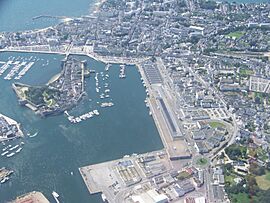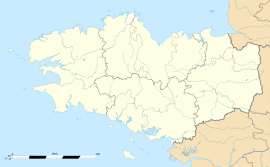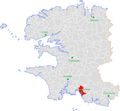Concarneau facts for kids
Quick facts for kids
Concarneau
Konk-Kerne
|
|||
|---|---|---|---|

Concarneau's harbour and centre
|
|||
|
|||
| Country | France | ||
| Region | Brittany | ||
| Department | Finistère | ||
| Arrondissement | Quimper | ||
| Canton | Concarneau | ||
| Intercommunality | Concarneau Cornouaille Agglomération | ||
| Area
1
|
41.08 km2 (15.86 sq mi) | ||
| Population
(2021)
|
20,607 | ||
| • Density | 501.63/km2 (1,299.22/sq mi) | ||
| Time zone | UTC+01:00 (CET) | ||
| • Summer (DST) | UTC+02:00 (CEST) | ||
| INSEE/Postal code |
29039 /29900
|
||
| Elevation | 0–36 m (0–118 ft) | ||
| 1 French Land Register data, which excludes lakes, ponds, glaciers > 1 km2 (0.386 sq mi or 247 acres) and river estuaries. | |||
Concarneau (pronounced Kon-kar-NOH) is a lovely town in Brittany, a region in northwestern France. Its name, Konk-Kerne in the Breton language, means "Bay of Cornouaille". Concarneau is located right next to the beautiful Baie de La Forêt (Forest Bay).
This French town has two main parts. There's the modern town on the mainland. Then there's the amazing medieval Ville Close. This "Closed City" is a walled town on a long island. It sits right in the middle of the harbour.
Historically, the old town was famous for building ships. Its strong walls were built way back in the 14th century. Today, the Ville Close is a popular spot for tourists. It has many restaurants and shops. You can also visit the fishing museum there. A bridge connects the Ville Close to the modern town. At the other end, a small ferry takes you to the village of Lanriec.
Contents
Fun Events in Concarneau
In August, Concarneau hosts a big yearly party. It's called the Fête des Filets Bleus. This means "Festival of the Blue Nets." The festival is named after the traditional blue fishing nets. These nets were used by Concarneau's fishing boats.
Celebrating Breton Culture
The festival celebrates the culture of Brittany. It also includes other Celtic cultures. Many towns in Brittany have such festivals. But the Filets Bleus is one of the oldest and biggest. Over a thousand people join in, wearing traditional clothes. Many more come to watch and enjoy. In 2005, the festival celebrated its 100th year!
Concarneau in Books
Concarneau was the setting for a famous book. It was written by Belgian mystery writer Georges Simenon. The book is called Le Chien jaune (The Yellow Dog). It was published in 1931. The story features his well-known detective, Maigret.
Concarneau's Economy
For a long time, fishing has been very important here. Catching tuna is a big part of it. Concarneau is one of the largest fishing ports in France. The company Les Mouettes d'Arvor is one of the last traditional canning factories in town.
New Industries and Tourism
Since the 1980s, other industries have grown. These include building boats. Summer tourism has also become very popular. The Ville Close helps separate the busy working port from the peaceful yacht basin.
People of Concarneau
People who live in Concarneau are called Concarnois (for boys and men) and Concarnoises (for girls and women) in French. In 1959, Concarneau became bigger. It joined with the nearby area of Lanriec. As of 2021, the town has about 20,607 people.
Breton Language in Schools
In 2008, a small number of children went to bilingual schools. In these schools, the Breton language is taught along with French.
Sports in Concarneau
The town has its own football (soccer) club. It is called US Concarneau.
Famous People from Concarneau
Some well-known people have connections to Concarneau:
- Michel Desjoyeaux, a famous navigator (sailor)
- Samantha Davies, also a talented sailor
- Guy Cotten, who started a clothing factory
- Stéphane Guivarc'h, a French footballer. He won the FIFA World Cup 1998 with the French national team.
Town Partnerships
Concarneau has special friendships with other towns around the world. These are called "twinned towns":
 Bielefeld, Germany (since 1969)
Bielefeld, Germany (since 1969) M'bour, Senegal (since 1974)
M'bour, Senegal (since 1974) Penzance, United Kingdom (since 1982)
Penzance, United Kingdom (since 1982)
Images for kids
-
Statue of Abraham Duquesne
See also
 In Spanish: Concarneau para niños
In Spanish: Concarneau para niños
 | Jackie Robinson |
 | Jack Johnson |
 | Althea Gibson |
 | Arthur Ashe |
 | Muhammad Ali |















